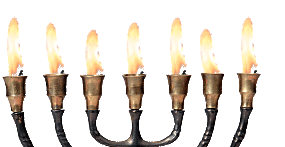Torah Study
In ancient times, to come as close as possible to God’s presence in the Temple in Jerusalem, one had to be considered holy and fully purified. In this week’s parasha, Korah makes a bold claim that “the entire community is holy.”
But were the Israelites truly ‘holy’? Or was ‘holiness’ always an aspiration for them, as it is for us.
Korah saw the status of ‘almost being holy’ as an insult. By contrast, we can see this status as a mission: to try to reach the level of the angels, knowing that it is a continual process of striving to come close to God and to walk in God’s ways.
Come join us this week for Torah study as we try to understand our ‘holiness quotient’ and our preparedness to engage in prayer.
Minutes of Torah
As they begin their trek through the wilderness, the Israelites’ grumblings peak in this week’s parashat Korach, which describes the most serious rebellion yet against Moses. The confrontation between Korach and Moses illustrates how anger will make any quarrel or disagreement problematic. The quality of anger is being expressed on all three sides of the conflict – Moses, Korach, and God — ultimately swallowing Korach and his supporters.
The portion opens when Korach, a Levite and Moses’s cousin, along with Datan and Aviram who were leaders of the tribe of Reuben, and 250 communal leaders, confronted Moses and Aaron, saying:
“You have gone too far! For all the whole community, all of them, are holy and Adonai is in their midst. Why do you raise yourselves above Adonai’s congregation?”
On its face, the dissidents’ grievance seems principled, as “the whole community, all of them, are holy.” But, upon closer look, the protestors’ motives are compromised by their personal stake:
· Korach’s protest sought to elevate him to Aaron’s High Priest position.
· And the rest of the rebels sought to recover their priority rights of inheritance.
Each dissident could be considered partial by virtue of having a personal interest at stake. While they accuse Moses and Aaron of “raising themselves about the community,” their moral objection appears to arise from self-interest.
As the confrontation reaches a boiling point, God’s anger erupts, and Moses and Aaron seek to temper Divine ire by appealing for level-headed justice. God responds to this appeal by seeming to calm down, allowing a warning to be issued which enables the people to separate themselves from Korach and his band before the earth literally opens and swallows the dissidents.
The passage reveals how anger can lead to catastrophic ends. Indeed, Jewish tradition generally implores us to purge ourselves of anger.
The early Sages said: “Anyone who becomes angry is like one who worships idols.” They also said: “Whenever one becomes angry, if he is a wise man, his wisdom leaves him; if he is a prophet, his prophecy leaves him. The life of the irate is not true life.”
At the same time, Judaism endorses anger as the moral fuel by which we battle injustice. Abraham shakes his fist at God for threatening the lives of the potentially, innocent people of Sodom and Gomorrah; Jacob rages at Laban for tricking him into serving him for twice as long as he had bargained for; Moses is incensed at the Egyptian taskmaster beating a slave; and of course, God flips out over any number of failings committed by the Israelites.
Anger stirs us from moral lethargy, impelling us to pursue acts of justice. When others hurt or abuse, anger generates steam by which we protect ourselves and others.
Yet when anger overwhelms our reason and makes us lose control, it can lead to previously unthinkable actions. Thus, when one has an awareness that an anger emotion is coming into play, we should first explore where the emotion came from, and then whether it can be transformed into a proper end.
We each have this capacity to create space where we can explore our anger and its resulting energy with a view towards eliminating or minimizing it. In his classic Mesillat Yesharim (“The Path of the Just”), the 17th century Rabbi Moses Chaim Luzzatto writes that,
“Our Sages have warned us against indulgence in anger even for a worthy cause. Not even a teacher should display anger towards a pupil, not a parent towards a child. This does not mean they should never reprove, but when they do, they should do so without anger, and only with a view toward correction.”
The prophet Jonah, perhaps the angriest prophet in our tradition, sulks in anger when God forgives the people of Nineveh. God asks the bitter Jonah, “is it good for you to be so angry?”
Parashat Korach illustrates anger’s destructive possibilities, and God’s question is directed to the ‘Jonah’ in each of us. This week, may we grow in awareness of the potential that angry energy can bring. May we slow down and make space in which we might channel it into acts of justice informed by compassion.
Shabbat Shalom, Rav Julius



